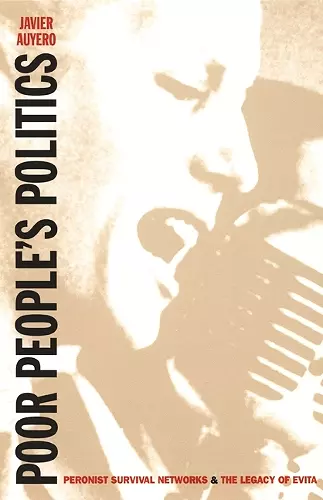Poor People's Politics
Peronist Survival Networks and the Legacy of Evita
Format:Paperback
Publisher:Duke University Press
Published:1st Jan '01
Currently unavailable, and unfortunately no date known when it will be back

This book explores the intricate political networks among Argentina's urban poor, revealing how they navigate clientelism for survival. Poor People's Politics offers profound insights into their experiences.
The term 'political clientelism' is used to describe the intricate relationships between political elites and impoverished communities in Latin America, where goods and services are exchanged for political support. In Poor People's Politics, Javier Auyero offers an in-depth ethnographic study focused on the Peronist Party's interactions with shantytown residents in contemporary Argentina. By examining the informal networks that the urban poor rely on for survival, Auyero sheds light on the complex dynamics of these exchanges and the various interpretations of Peronism within these communities.
Auyero's research is rooted in the lives of the residents of Villa Paraíso, a marginalized shantytown in Buenos Aires. He explores how local politicians deliver essential favors to the impoverished and how these individuals perceive and assess such assistance. Through his detailed observations, Auyero uncovers the structure of these networks, the nature of the transactions that occur, and the pivotal role women play in facilitating these exchanges. He argues that the act of providing resources in return for votes carries a performative significance, shaping the relationship between those seeking help and those offering it, while also producing varied interpretations of contemporary Peronism.
In Poor People's Politics, Auyero reexamines the ties between politics and the destitute in Latin America, revealing how politics are intricately woven into the lives of those who may not mobilize in conventional ways but are far from passive. This book is a valuable resource for students and scholars across multiple disciplines, including sociology, anthropology, political science, and cultural studies, as it highlights the resilience and agency of the urban poor in navigating their political landscape.
“At the level of most political science literature on urban poverty and clientelism, this work is genuinely pathbreaking. Combining the best of ‘thick description’ ethnography with a sense of more global processes at work in a society, Auyero uses the most up-to-date analytical frameworks to interrogate an object of study that has rarely—if ever—been so addressed. This is a book to be reckoned with over the next few years and beyond.”—Daniel James, author of Doña María’s Story: Life History, Memory, and Political Identity
“Other people write about patronage politics as a form of organization, as a scourge to eradicate, or as a necessary evil on the way to full democracy. Javier Auyero writes about it as a raucous, improvised, crucial way of surviving poverty and inequality. Reporting perceptive first-hand observations in playful, energetic prose, Auyero illuminates poor people’s politics in Argentina and elsewhere.”—Charles Tilly, Columbia University
ISBN: 9780822326212
Dimensions: unknown
Weight: 449g
272 pages